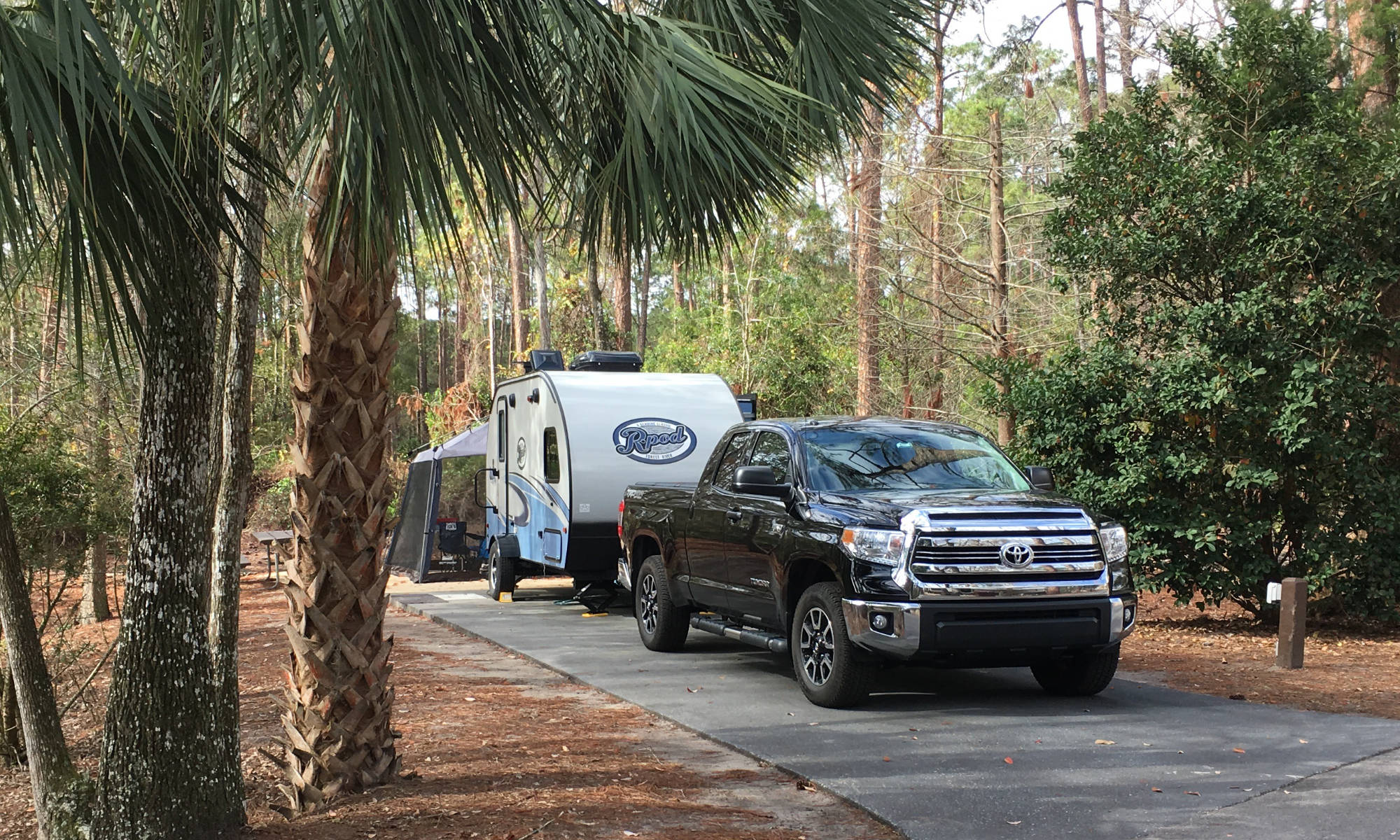This blog will cover the latest RV and travel data news. May 2023 RV production numbers are out, and shipped units are down again, both versus the prior month and year over year. We’ll cover all the numbers, so you can better gauge if it’s time to buy, sell or hold an RV. We’ll also discuss the outpouring of comments received from last month’s newscast about Florida State Parks limiting out-of-state reservations. We’ll get into this and more.
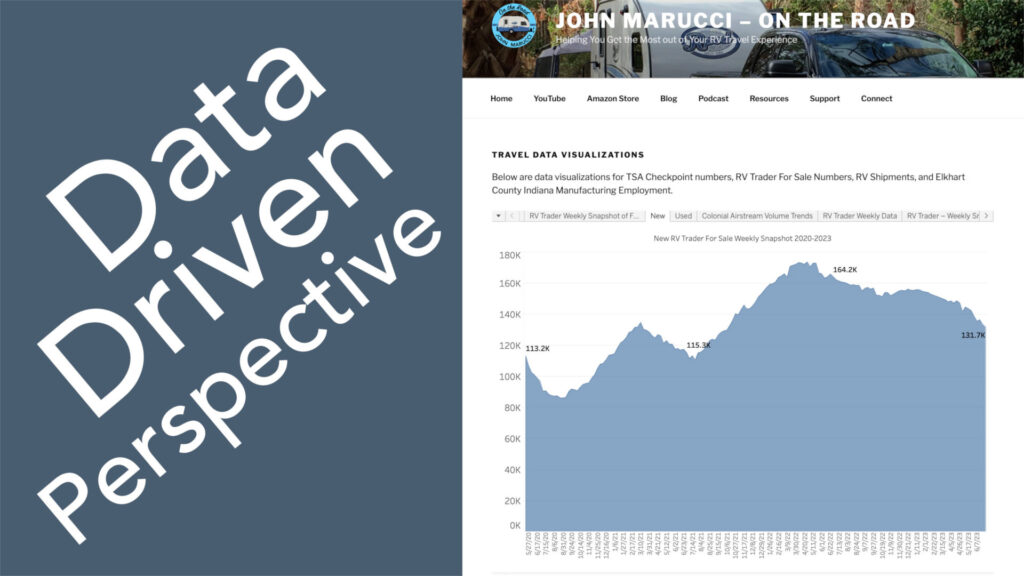
Before we look at our monthly data, just a quick reminder of why we do data-driven news. The main goal of giving you a data-driven perspective of the news is so you can understand the market and make better decisions. For example, a year ago it was a strong seller’s market, with used RV prices fetching more than some owners paid for their new RVs. Today is the exact opposite. We started sounding the alarm a year ago in May to our viewers that a correction was coming, and so it did.
RVIA Numbers
On June 26th, 2023, the RVIA posted the latest RV wholesale shipment data for May 2023. Production numbers continue a downward trend compared to the prior month and are significantly down year-over-year, as expected. 30,919 total RVs were shipped in May, compared to the record 50,529 in May 2022, down about 39% year-over-year. Travel trailers witnessed a significant decline, with only 20,595 shipped in May vs. a record 35,213 a year ago, about a 42 percent decline. It was by far the worst May for towable trailer shipments other than 2020 in over six years. Almost 4,000 fewer travel trailers were shipped than in May 2016.
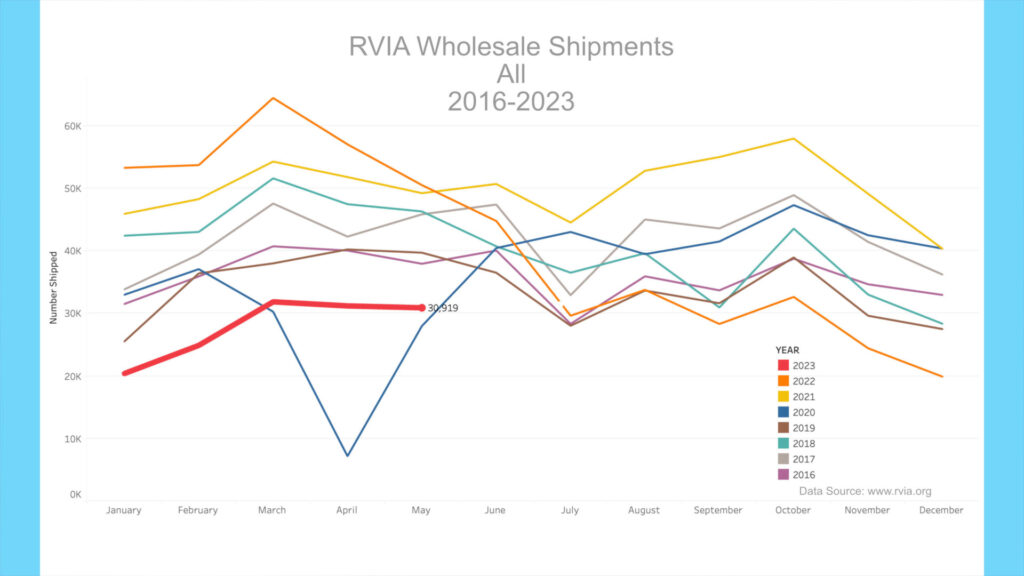
The long and short of it is that the RV industry is in a downturn, with production dropping and less demand. The industry greatly overproduced during and after the pandemic betting that RV demand, which spiked during the pandemic, would be the new norm. The bet was a huge miscalculation with a massive hangover effect. In 2021, the industry produced 600,000 RVs, the forecast for 2023 is now only 300,000. This rollercoaster has dynamic impacts throughout the entire supply chain. It was an epic failure in planning, no matter how the industry spins it. It means that potential RV buyers can swing significant discounts on new but stale inventory right now, with the caveat of pandemic trailer quality issues we have discussed many times on this newscast.
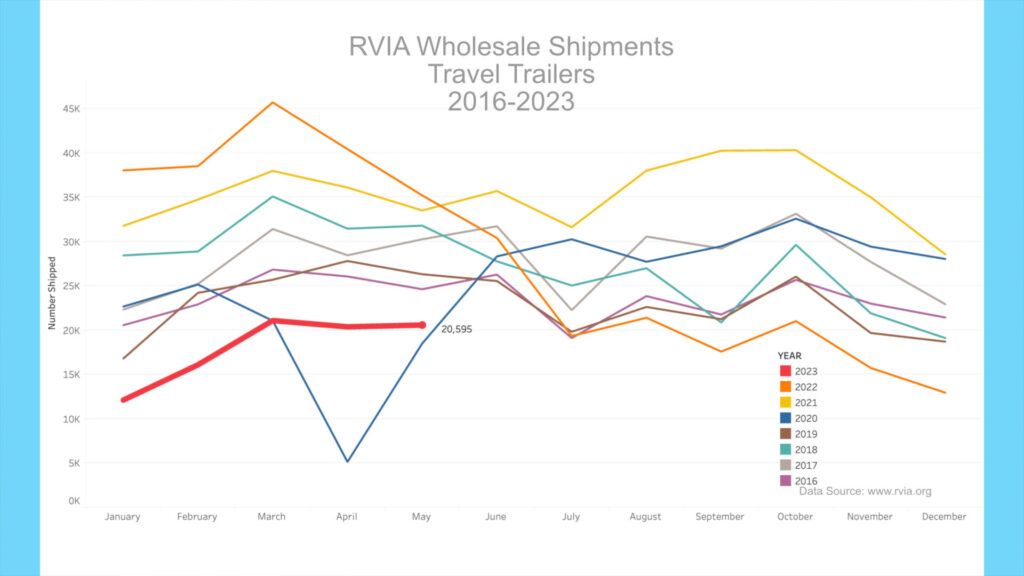
RV Trader Numbers
Meanwhile, RVs for sale on RVTrader.com are declining, with new units seeing a substantial decline since last month and used units for sale continuing to increase. This points to significant discounts on new units that are crowding out the sale of used units. There were 131,676 new units for sale as of June 28th. This is down about 10,600 units from late May’s 142,311 units and down approximately 32,000 new units versus late June 2022.
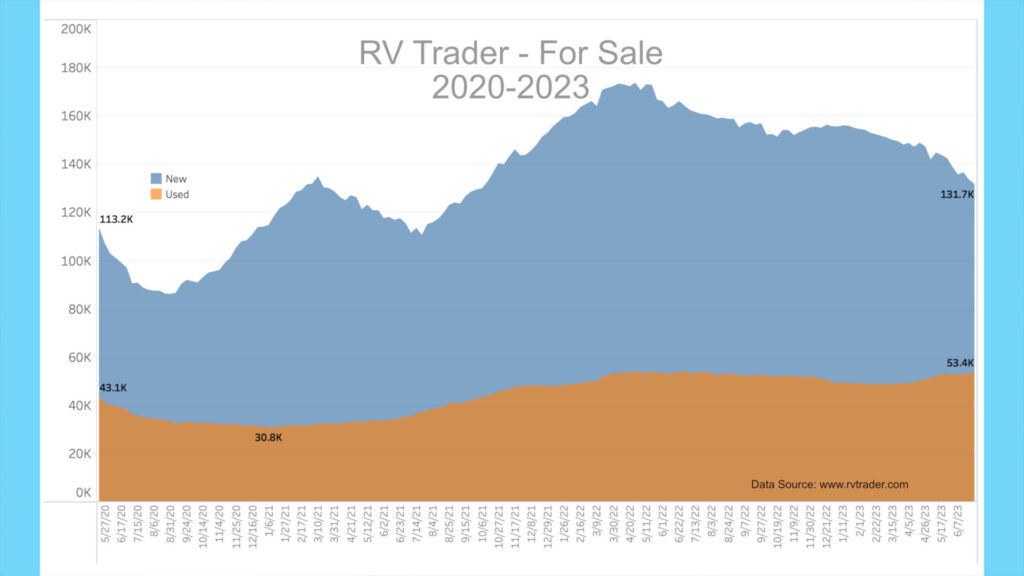
Used units for sale increased by about 500 to 53,424, up from 52,916 last month, as more people attempt to unload used RVs. This is now the eleventh week in a row with used for-sale units above 50,000 after four months in a row below 50,000. This time last year, the number of used RVs for sale was 54,169, so we have about 750 fewer used units for sale versus late June 2022. As expected, we are seeing new inventory decline and used units for sale increasing at the end of the Spring selling season. Given that new unit pricing has been significantly discounted, the swing to purchasing new vs. used has moved toward the new market. Be aware that according to RVTrader.com, there are still over 29,000 new 2022 RVs on dealer lots, should you be in the market. We have heard of discounts of over 40% on some of these units as dealers greatly desire to clear older inventory.
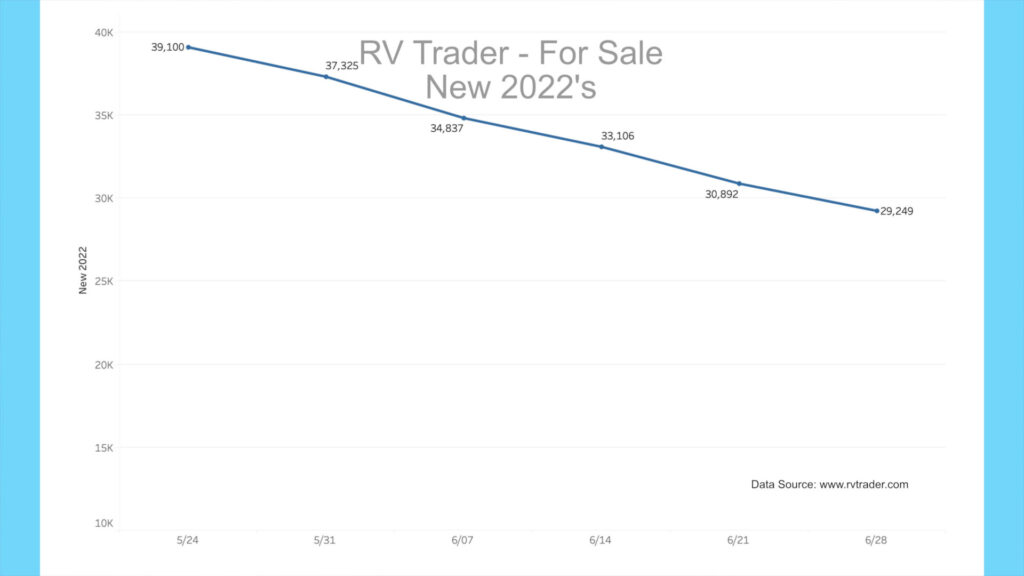
BLS RV Manufacturing Labor Stats
The Bureau of Labor Statistics has revised Elkhart County, Indiana’s latest manufacturing employment data for April 2023. The revision shows that at the height of production last April through June of 2022, there were 77,200 people employed in manufacturing. For April 2023, this number stands at 70,500 people, down 6,700 since the peak. The employment number will likely sink further going into the fall as manufacturers and suppliers can’t afford to keep employees on with the current demand shortfall. Accordingly, the unemployment rate based on May preliminary numbers has risen to 3.7% from 2.8% in April.
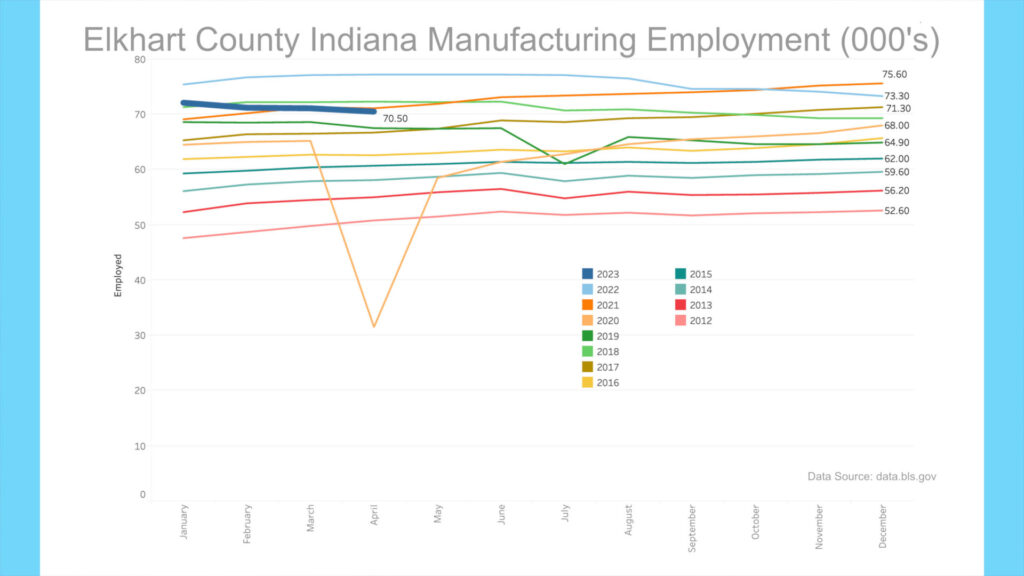
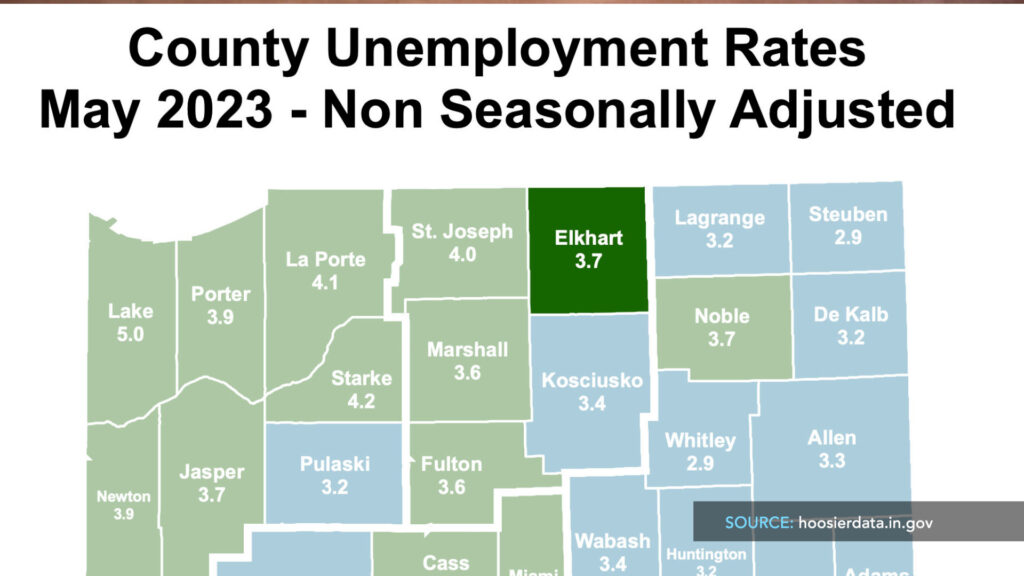
High-End Market
For the high-end market, inventory levels for Colonial Airstream in Millstone Township, New Jersey, one of the nation’s largest Airstream dealers, continue to move towards a buyer’s market with in-stock units remaining high.
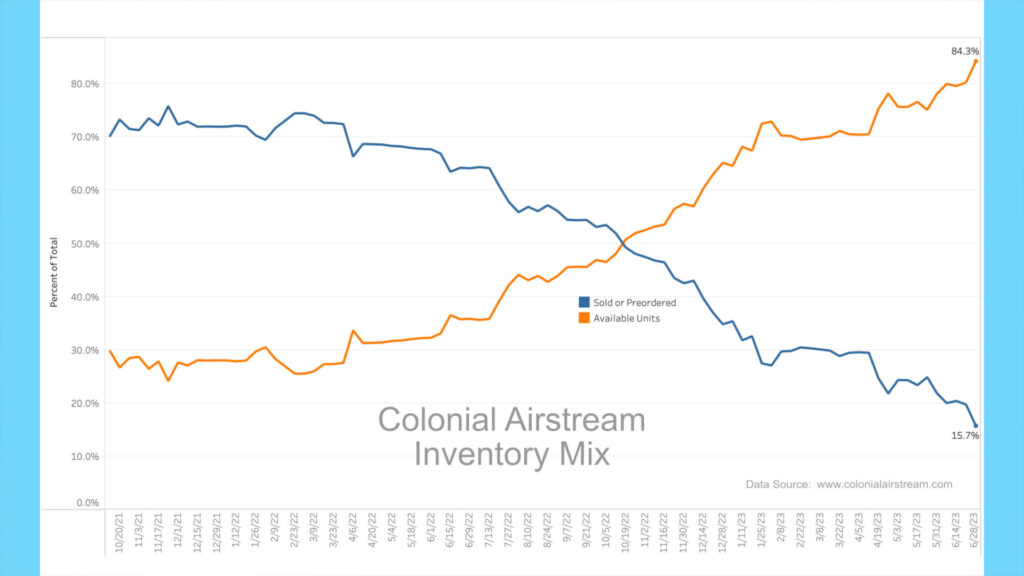
About a year ago, roughly 64% of Colonial’s inventory was preordered, meaning only 36 percent of their Airstream inventory was either on the lot for sale or being delivered and available. As of June 28th, 2023, roughly 84% of inventory is available for sale, with only 16% spoken for. This is a considerable increase in sellable inventory from a year ago and a pendulum swing to a buyer’s market. It is not a bad time to be shopping for an Airstream. The caveat is that MSRPs have risen considerably in the past few years, so even discounted, these units can be very pricy. Also, the mix of units available looks to be higher trim levels, meaning higher prices.
AAA
Gas prices have declined slightly in the past month. According to AAA, the current average nationwide price as of June 28th was $3.556 per gallon for regular unleaded, down $.022 from a month ago and down $1.33 per gallon from a year ago. An RV trip of 3,000 miles at 10 mpg would cost $1,067 now vs. $1,464 a year ago, about a 27% decrease YoY. For context, gas prices were the highest ever recorded in June last year. Diesel prices declined even farther below the $4 mark and now sit at $3.877, down about $.09 from a month ago and down $1.91 from a year ago. A similar 3,000-mile trip getting 15 mpg would cost $775 now vs. $1,157 a year ago, a 33.0% decrease.
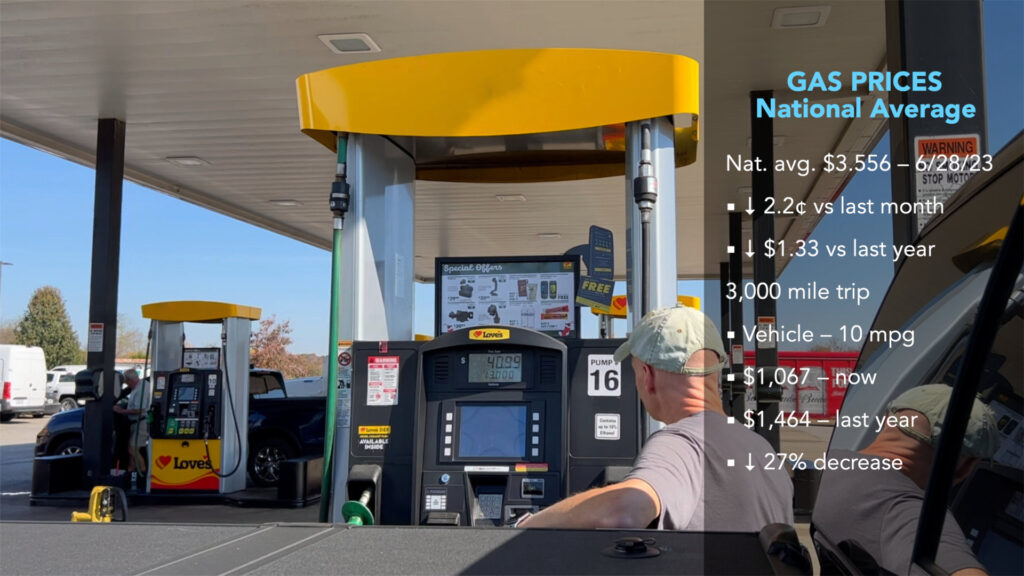
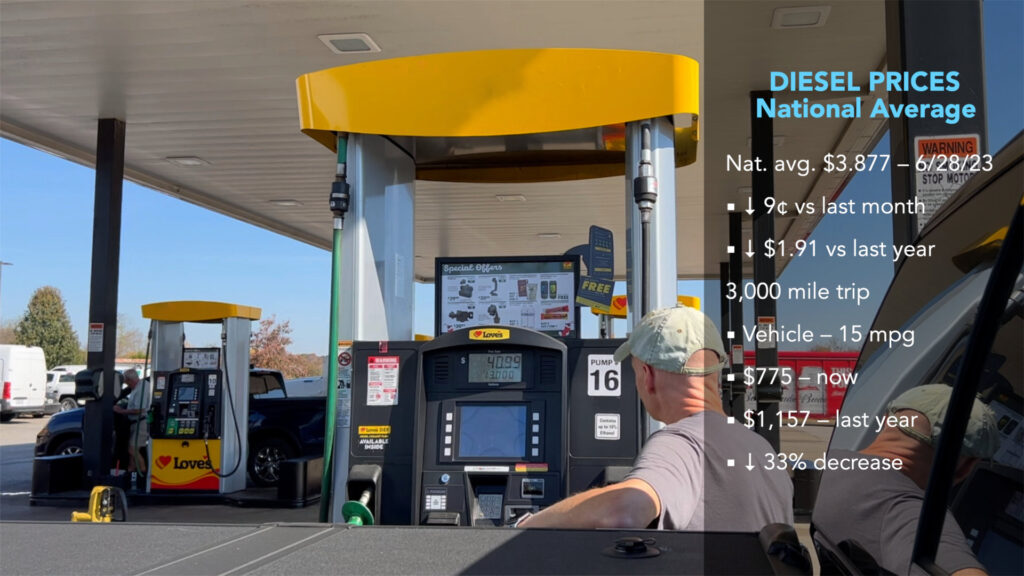
Florida State Parks Reservation Changes Responses
We are again going to cover the Florida State Park reservation story this month simply because it is the biggest RV news story of the past several months and impacts many people – both residents of Florida and people who visit from out-of-state.
Within 12 days of publishing last month’s newscast, we had over 100,000 people watch the video and now have over 400 comments.
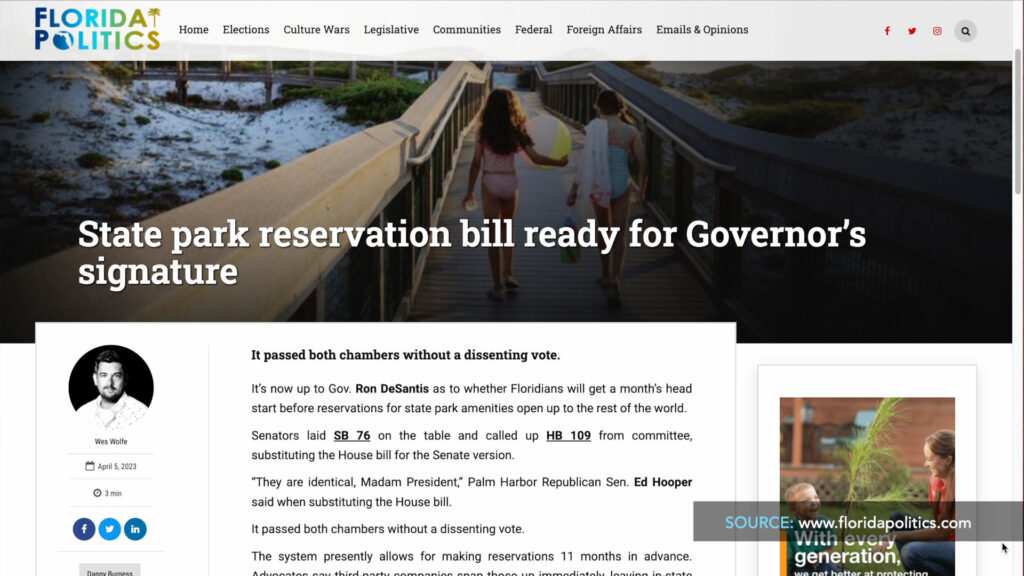
As a reminder, the recently signed bill CS/HB 109 allows Florida state residents to book state park campsites 11 months in advance with proof of citizenship of a Florida driver’s license or identification card.[1] Non-residents will now be curtailed to book ten months in advance, a month later than residents. Before this change, non-residents could also book 11 months in advance. The law goes into effect on January 1st, 2024.
The range of comments on the subject was eye-opening as I hadn’t expected the content to spur the incredible outpouring of arguments and emotion on both sides of the issue.
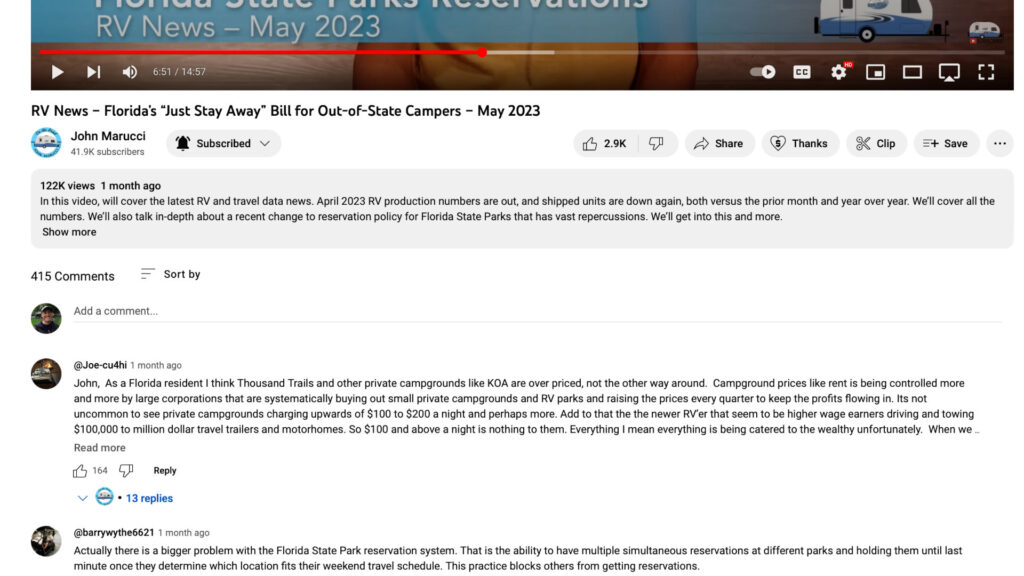
Here is a synopsis of many of the responses:
First, there were dozens of comments from Florida residents who were very glad about the new law. The consensus was that this was fair to residents and overdue. The same group generally thought out-of-state campers take away opportunities for residents to use their state parks, especially during winter months. Some comments were blatantly unwelcoming, while others argued clearly why this was a good idea. Even people from other states weighed in that this was a good bill for Florida residents. Some mentioned that other states are doing this.
My take on this group of comments was that there was too much optimism given the 11-month window. Many talked as if they would now be able to find campsites finally. My concern was that these same people were not committed to planning and booking early. I did respond to several people mentioning that the only winners will be the Florida residents who plan out 11 months. If you are a Florida resident and not a planner, plan for continued frustration. The root problem here is that there is no incentive for Florida State Parks to increase camping capacity, so the supply shortfall will continue.
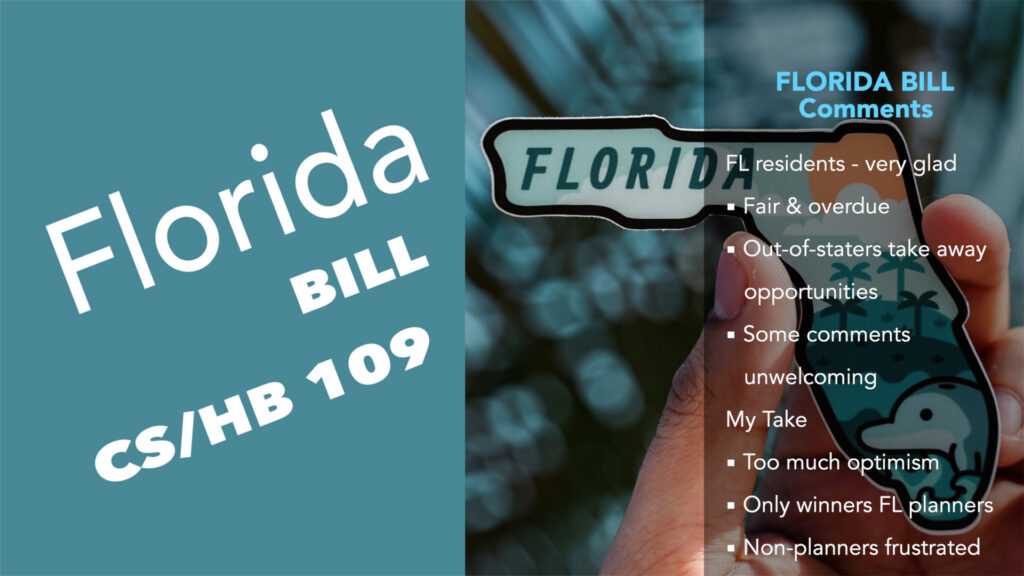
Regarding other states doing similar things, I found some states with higher fees for non-residents but none (so far) with earlier booking windows. Please comment if you have documentation otherwise. I am in the process of updating our State Park booking map, and accurate information is essential. Interestingly, I did discover that Michigan’s DNR recently opposed a Michigan bill on a similar measure that Florida passed. One Michigan state representative from Wayland, Michigan, wanted to give Michigan residents a two-week lead time on state park reservations over non-residents. The Michigan DNR, which manages Michigan state parks, opposed the measure citing potential retaliation from other states and reputational injury for enacting such a law. The bill subsequently died, and the rep is no longer in the Michigan state house.
Second, many people, generally from other states, pushed back. Many of these made the point about lost revenue from visitors since Florida receives much revenue from tourism. Others talked about Florida’s reputational hit given the latest message sent by the bill to people out-of-state. I think both counter-arguments have some credence, yet likely won’t have a significant impact. The change to the Florida state park booking window will affect a small portion of total Florida tourism dollars, and the reputational hit will also be minimal but unknown. I hold to my conclusion that the state parks will see a decrease in booking revenue given that snowbirds won’t easily cancel reservations versus local residents. For example, when winter temps stay below freezing for a time, locals will be more likely to cancel than someone 1,000+ miles from home with no options. Unfortunately, I do not have further data from the state parks to show the differential in cancelation rates between residents and non-residents to prove this point.
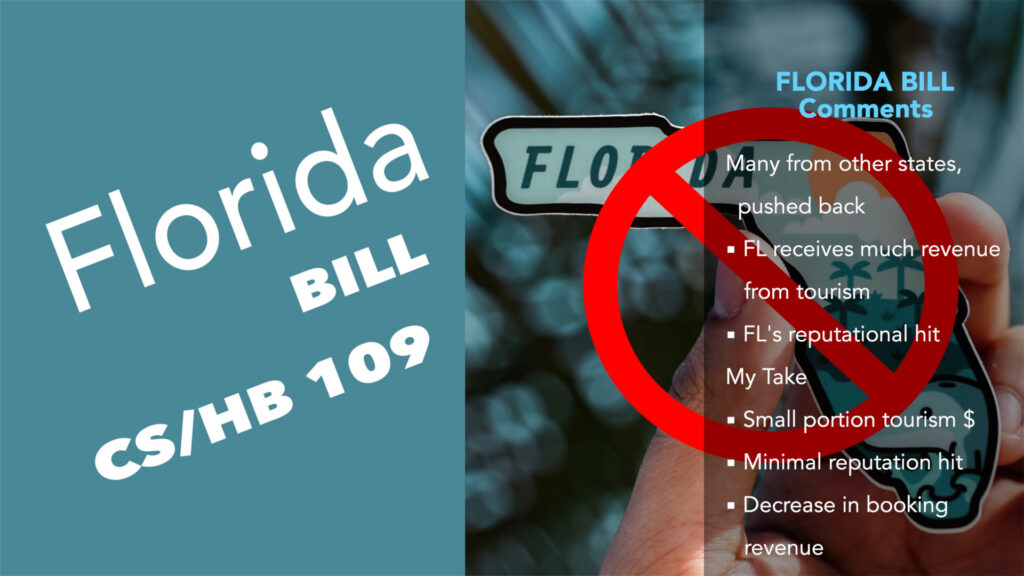
Third, the most powerful argument that came out of the comments likely had to do with systemic issues with the current booking system. Right now, anyone who books online can book overlapping reservations, meaning one can secure multiple reservations and cancel the reservation not wanted up until the last minute. This leads to empty sites and lost revenue. A range of solutions was offered, including very high cancelation fees and fixing the system to not allow multiple overlapping reservations. Most agreed that the current policy causes much of the lack of capacity via last-minute cancelations. Unfortunately, the new bill does nothing to remedy this.
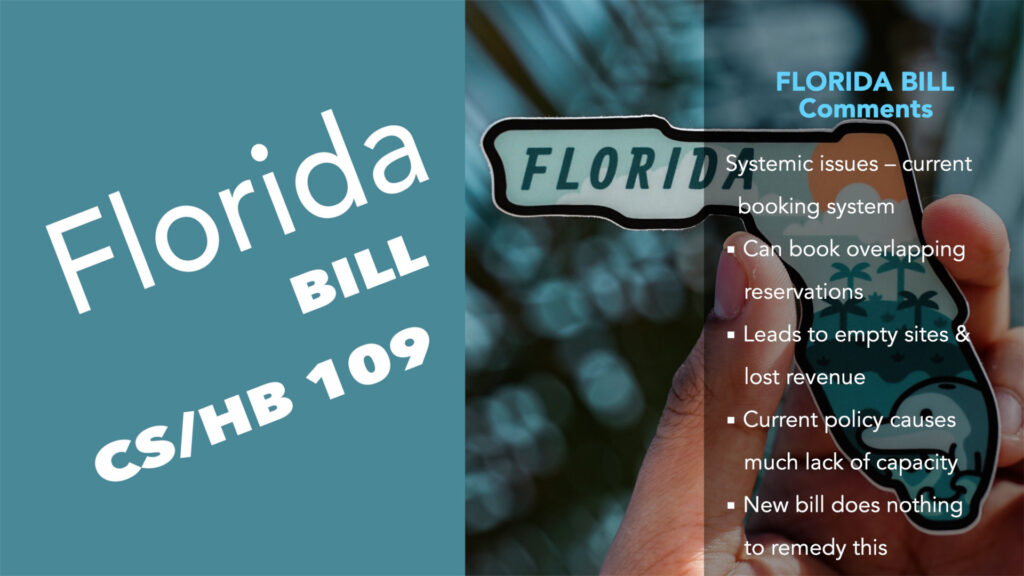
Finally, many non-residents who had used Florida State Parks for a long time were disappointed with the decision. I put myself in this group. Several of these folks said they would no longer be going to Florida, which is too bad. I suppose all good things in this regard come to an end. I didn’t hear any of these people say they would now change to private campgrounds, so I think it will be a complete loss to them. Most from this group will likely stay home and give up RVing in the winter or go to another warm place. This is too bad, but a reality that can’t be softened. Many will have to find other winter options.
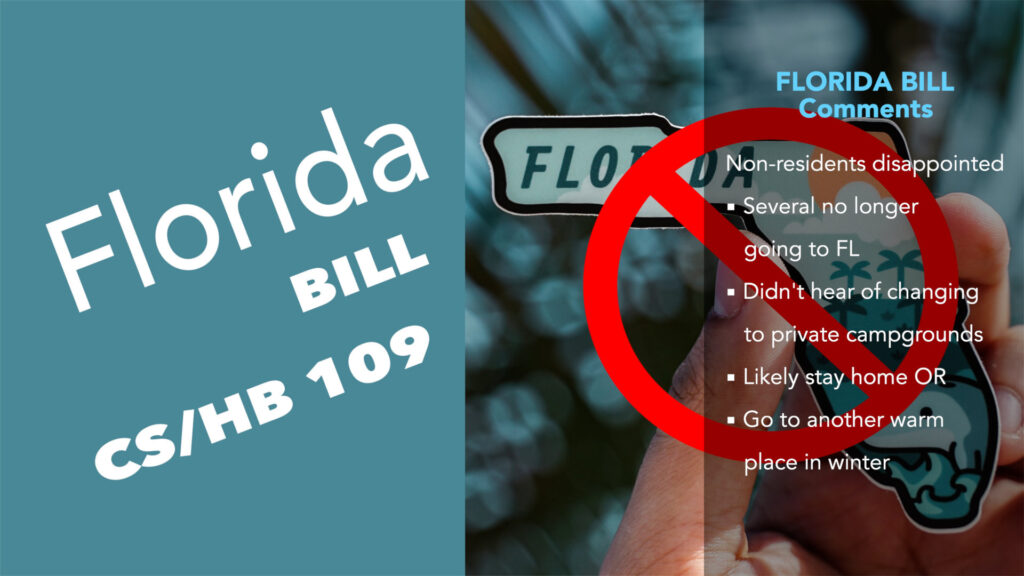
I stick to my conclusions from last month’s newscast that the new bill isn’t a good deal for Florida residents other than those who plan 11 months in advance. Those who do plan out that far in advance will face much less competition for winter camping spots. For everyone else, the same frustrations will likely remain.
In conclusion, there are two things not covered in the last newscast that became apparent in the comments: first, the system needs to change to lower late cancelations and empty sites; and second, there is no incentive for Florida State Parks to increase campsite capacity, even though Florida’s population has grown. The former is a programming change to the system that could happen quickly; the latter is a problem with policy and state park budgets and a longer-term challenge. Until more capacity is added, frustrations of getting campsites will continue even with non-residents at a disadvantage.
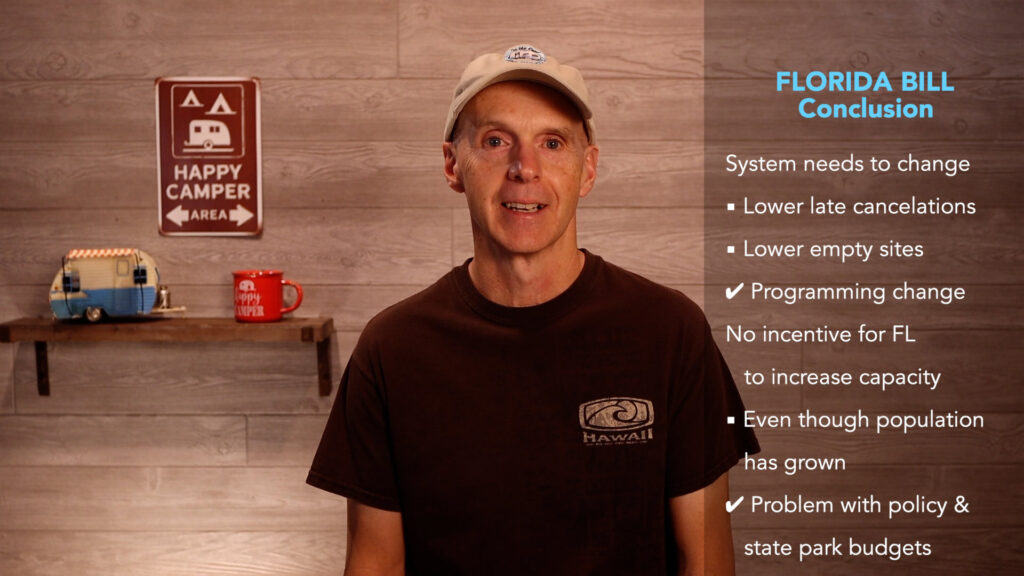
Okay, that should wrap things up.
All the best in your camping endeavors!
As always, thanks to our fans who support our efforts by starting their shopping from our Amazon Storefront and by their generous financial support by using the THANKS feature located under each YouTube video ($ within the Heart icon). Your support is greatly appreciated!
-
https://flsenate.gov/Session/Bill/2023/76 ↑
